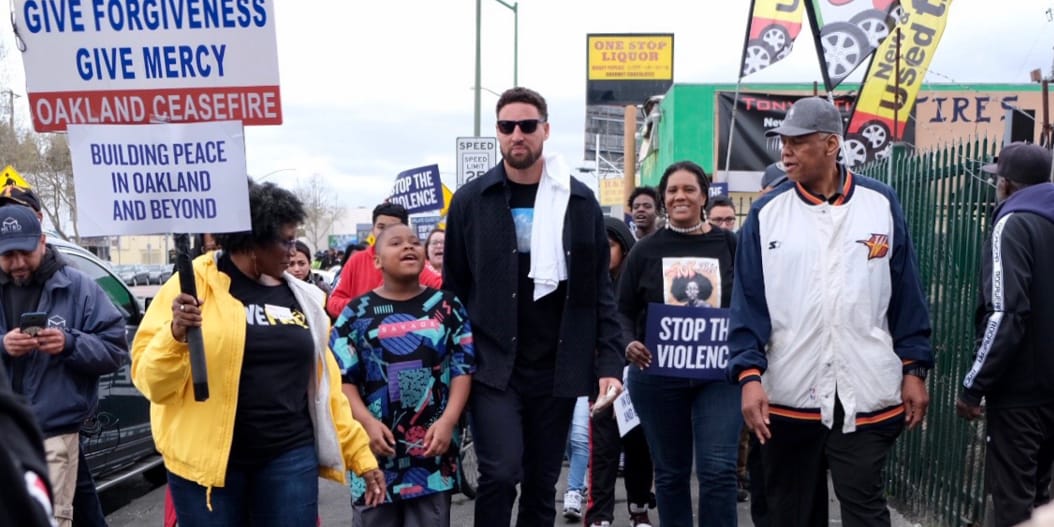
Golden State Warriors Join Oakland Activists to March for Peace
Oakland’s story is one of progress underway—to continue saving lives in Oakland and other cities around the country, we must fund proven violence intervention programs.
Oakland, California, has cut its annual shootings and homicides nearly in half since 2012. This progress is no accident, and it’s no miracle: it’s the result of years of hard work by activists, social service providers, and law enforcement willing to work together in sustained collaboration through the citywide Ceasefire strategy. And it’s the result of taxpayers and policymakers willing to fund these efforts.
On Friday, Steph Curry, Klay Thompson, and Coach Steve Kerr of the Golden State Warriors joined us in Oakland for a series of events, including a peace walk, to celebrate Oakland’s progress, acknowledge the work left to be done, and call for sustained funding of Ceasefire.
Despite the lifesaving progress being made in Oakland, too many young men of color are dying every year. There were 75 homicides in Oakland in 2019. “Behind every number is a life,” said Reygan Cunningham, formerly the program manager of Oakland Ceasefire.
She cautioned against a premature celebration of progress that doesn’t acknowledge these 75 lives—and the many more lives touched by gun violence in Oakland every year, from those shot and wounded to those who lose loved ones far too soon.

Last year, Governor Newsom allocated $30 million to fund the California Violence Intervention and Prevention grant program (CalVIP) which funds violence intervention work in Oakland and other evidence-based strategies throughout the state. But the governor’s initial 2020 budget proposal includes only $9 million in annual funding, which would be a step in the wrong direction for the Golden State.
Oakland’s Inspiring Transformation
Last year we released the report A Case Study in Hope: Lessons from Oakland’s Remarkable Reduction in Gun Violence , highlighting the lifesaving progress the city has made and outlining takeaways for other cities seeking to make their residents safer.

More than anything else, progress in Oakland is the result of partnership: it required different groups working in concert to reduce violence, build police-community trust, and improve outcomes for high-risk individuals.
Oakland used data to correct misconceptions about the sources of gun violence, which then allowed social service providers to home in on the small number of individuals at highest risk of violence with offers of targeted resources.
As Coach Kerr said in a town hall following Friday’s peace walk, “the only way we’re going to get things done is to really get to the core of the problem.” Through its complementary intervention strategies, Oakland has found an effective way of getting to the core of the problem—by offering young men who have been failed by the system an alternative to picking up a gun.
One of the key lessons from Oakland’s citywide strategy—and the reason why earlier iterations failed—is that programs must be funded consistently to have a meaningful, long-term impact. When funding for programs dips or is cut altogether, clients who rely on these services no longer have a safety net. Communities lose trust in the strategy, and progress is jeopardized.
A Call to Fund CalVIP
At a closed door event before the peace walk, violence reduction practitioners and service recipients gathered to discuss the importance of working together to preserve and expand Oakland’s progress, with Steph Curry, Klay Thompson, and Coach Kerr joining the discussion to demonstrate their commitment to the community.
Pastor Michael McBride, director of the LIVE FREE campaign with Faith in Action, talked about how the work of saving black and brown lives in urban America has largely been left to black and brown Americans to do themselves, without institutional support. Too many government officials didn’t believe—and still to this day don’t believe—that this is a problem deserving of government resources.

“When decisions are being made by people in power, they have to hear our voices and what our priorities are,” said Reygan Cunninham.
We’re calling on our elected officials in California to demonstrate that saving lives is a priority by funding CalVIP at $39 million per year. The cost is nowhere near as high as the stakes, and it’s a drop in the bucket compared to the billions of dollars that gun violence costs California each year.
We can’t save the 75 lives lost to homicide in Oakland in 2019, can’t take away the pain and heartbreak their loved ones will suffer for the rest of their lives.
But we can fight with everything we have to fund the solutions that we know save lives, to make sure that the people doing this work on the ground day in and day out are being supported, trained, and paid fully for their critical work.
Save More Lives
Oakland is a model for other cities. Learn how proven violence intervention strategies can save lives in cities nationwide.
Are you in California? Contact your representatives at (202) 224-3121 and ask them to express their support for fully funding CalVIP at $39 million per year.